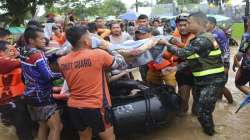Philippines: At least 42 killed, several missing as floods and landslides ravage southern part of country
According to Naguib Sinarimbo, the interior minister for a five-province Muslim autonomous region governed by former rebels, the majority of the dead were washed away by raging floodwaters and drowned or were struck by debris-filled mudslides.

At least 42 people were killed, 16 still missing, and some residents are trapped on their rooftops as a result of flash floods and landslides that ravaged a southern province in the Philippines.
According to Naguib Sinarimbo, the interior minister for a five-province Muslim autonomous region governed by former rebels, the majority of the dead were washed away by raging floodwaters and drowned or were struck by debris-filled mudslides in three towns in hard-hit Maguindanao province.
“The amount of rainwater that came down overnight was unusually (heavy) and flowed down mountainsides and swelled rivers. I hope the casualty numbers won't rise further but there are still a few communities we haven't reached,” Sinarimbo said, adding the rains had eased since Friday morning, causing floods to start to recede in several towns," the minister was quoted as saying by the Associated Press.
According to reports from mayors, governors, and disaster response officials, at least 27 people died in Datu Odin Sinsuat town, 10 in Datu Blah Sinsuat town, and 5 in Upi town, all in Maguindanao, primarily from drowning and landslides.
Several people are still missing: Interior Minister
Meanwhile, Sinarimbo claimed that at least six people were reported missing in Datu Blah Sinsuat and 10 others in Upi. “They were able to rescue some earlier but now they're only trying to dig up bodies there,” he said, adding it was not clear how many were missing in Kusiong because of confusion after the tragedy struck the community.
The country's Army officials claimed that at least 42 fatalities were reported from Maguindanao. They further said that the forces were "continuing to rescue individuals stranded in the water in conjunction with local disaster teams" and transporting the displaced in army vehicles to evacuation camps.
Sinarimbo said many low-lying communities saw quick rises in floodwaters that forced some inhabitants to climb onto their roofs, where they were saved by army personnel, police officers, and volunteers. He further said many of the swamped areas had not been flooded for years, including Cotabato city where he resides.
“In one area in Upi only the attic of a school can be seen above the floodwater,” disaster-response officer Nasrullah Imam said, referring to a flood-engulfed town in Maguindanao.
The Philippines ravaged by several storms this year
The wide rain bands of Nalgae, the 16th storm to hit the Philippine archipelago this year, enabled it to dump rainfall in the country's south although the storm was blowing farther north, government forecaster Sam Duran said.
Late Friday afternoon, the storm was about 180 kilometres east of Catarman town in Northern Samar province with sustained winds of up to 85 kilometres per hour and was moving northwestward.
Several cities put on high alert
Dozens of provinces and cities were under storm alerts including the capital, Manila. Fishing and cargo boats and inter-island ferries were barred from venturing out to sea, stranding thousands of passengers, the coast guard said.
About 5,000 people were protectively evacuated away from the path of the storm, which was not expected to strengthen into a typhoon as it approached land, government forecasters and other officials said.
About 20 typhoons and storms batter the Philippine archipelago each year. It is located on the Pacific “Ring of Fire,” a region along most of the Pacific Ocean rim where many volcanic eruptions and earthquakes occur, making the nation one of the world's most disaster-prone.
(With inputs from AP)
Also Read: Pakistan floods impacted 16 million children, says United Nations